Most participants shared similar views on the nature of problems caused by the oligarchic model in Ukraine. The many chronic diseases of this model that were mentioned in the discussion persuaded everyone that it had to be eliminated in order to create the right environment for the dynamic development of Ukraine’s economic and human potential, based on free and competitive entrepreneurship. However, for the most part, participants omitted the fact that the oligarch-controlled model is a typical feature of Eurasian, Russian and Soviet civilization. To overcome it, European states that had been under its pressure for a certain period have to successfully undergo de-sovietization and consolidate their national identities. The experience of the Baltic States shows that the situation is currently much worse in countries where the process was slower, such as Latvia, compared to states that made a greater leap in eliminating the impact of Soviet colonialism, such as Estonia. When the discussion came around to means for overcoming the oligarchic model, opinions were split, revealing the lack of a clear plan to solve the problem within the parliamentary opposition.
Batkivshchyna’s Andriy Pavlovsky, for instance, noted at the end of the discussion, that any talk of de-oligarchization and de-monopolization are “merely theoretical, not backed by anything real” as long as the Yanukovych regime is in power. Clearly, the opposition’s priority task is to get rid of the ruling regime, but the problem is that Yanukovych was already removed from the government once before in 2004, but it did not change the system which eventually led him to victory in 2010. The change of government should not be a goal in itself for the opposition, nor a guiding principle of “removing them first and thinking about what to do next later”. It is now that the opposition should offer society a clear algorithm of its actions if the current regime is removed, and explain to most voters why they should support the opposition rather than vote for it simply because it is against the regime. De-oligarchization and de-monopolization should be the key issues on the opposition’s agenda. Otherwise, the changes will not be systemic or irreversible.
UDAR’s Rostyslav Pavlenko and Oksana Prodan spoke of the right, but general changes to set the scene for removing the oligarchic system. They stressed the need to overcome corruption as an integral component of the flourishing oligarchy; increase the liability and accountability of officials before the public and local authorities. They mentioned small and medium businesses and NGOs as the potential social base that could boost these transformations. UDAR’s MPs claim to have a set of draft laws and specific proposals, and insist that their political force will include all the initiatives outlined at the discussion into its agenda.
It is merely necessary to wait for the time when relevant initiatives will actually be considered by parliament and presented to the public as the party’s action plan. Meanwhile, the speeches of UDAR’s MPs suggest that their initiatives do not currently provide for any special measures to de-monopolize the economy and deprive the oligarchs of their opportunities to affect the political process of feeding their personal parties.
The intentions of Batkivshchyna, as mentioned by its MP, Andriy Pyshnyi, are aimed at general transformations in the country which, in turn, would indirectly sideline the oligarchic model. So far, Pyshnyi has admitted that Ukraine’s prospects are grim, as long as oligarchs call the shots to ruling parties, but he said that Ukrainian politics is a fairly expensive process, therefore politicians have to look for alternative sources of funding. One possible source he mentioned was the partial coverage of election campaign costs by the government for the parties that make it into parliament, but this will hardly become the main source of funds for the parties to cover the significant spending that they only reflect in small portions in official reports. In this respect, a survey by the Democratic Initiatives Foundation, conducted before the latest election shows interesting results: 6% of Ukrainian voters are willing to support political parties with party fees today. The average amount they are willing to pay is nearly UAH 1,500. 6% of Ukrainians, even if only those employed are counted, is over 1 million people. This is enough to set up two or three powerful parties, supported by their members and non-oligarchic business. It is forces like this that are capable of dramatic transformations.
Other instruments of de-oligarchization that Pyshnyi mentioned include the new Election Code with rules allowing voters to recall an MP and providing for open party lists. However, the latest election proved that party leaders tend to leave figures linked to oligarchs or prone to crossing over to other parties on their party lists despite the criticism of civil activists and the media. Pyshnyi also said that his party had already prepared a Code of Economic Growth, an anti-corruption package with a relevant lustration procedure, and a draft law to nationalize enterprises, previously illegally privatized by oligarchs. All this is intended to support non-oligarchic business. If implemented, all these initiatives will have an important impact and may weaken oligarchs for a while, but these moves will not eliminate the oligarchic model in Ukraine completely, so it could re-emerge shortly thereafter.
Unlike Batkivshchyna and UDAR MPs, Svoboda representatives used the discussion as a platform to present draft legislative initiatives on possible ways to de-monopolize the economy and return assets that had been transferred to offshore zones. But, even the few provisions they revealed seemed to be a good starting point for a relevant debate in parliament, rather than a tool to solve problems.
The Svoboda-drafted initiatives can only be effective if paired with the resolution of a slew of political and economic problems, or afterwards. Without adjusting them to possible side effects and hidden mines, radical initiatives may become handy tools for the authoritarian regime and harm the independent non-oligarchic business that is expected to be one of the pillars for Ukrainian transformations. For instance, the anti-monopoly legislation will not cover all the oligarchs’ assets (Svoboda proposes the nationalization of assets which currently give a specific oligarch, control of more than 25% of the market. The resale of the asset will pay the oligarch the amount he initially spent on its purchase). Meanwhile, attempts to solve the problem by means of cutting the monopoly threshold for the forced sale of monopolistic enterprises on regional and local levels could also threaten non-oligarchic business, as its production facilities may naturally have a large share of the regional market where they operate. Meanwhile, five or seven oligarchs with their diversified conglomerate that operate in various branches and control 10-15% of the market in each industry will have the opportunity to continue their complete domination over the economy, and regain their control over politics within a short period.
Svoboda’s claim that the provision on the mandatory re-registration of offshore companies in Ukraine will be harmless to medium business because it does not operate through offshore zones seems doubtful. In fact, offshore schemes are extensively used by small and medium-sized business, given the unrestrained tax authorities, the lack of an independent court and corrupt law enforcement agencies. In this situation, such schemes seem to be virtually the only option for competing with other market players, including those linked to the government. In addition to this, Ukraine lives by a well-known dictatorial rule, whereby “friends get everything while foes get the law”. Non-oligarchic business may be ready to return assets from offshore zones and give 50% back to the government as Svoboda suggests, but it does not see any guarantee of not turning into a victim itself as a result. Leaving these, as well as other potential risks out when finalizing and possibly passing radical initiatives could discredit the very idea of a struggle against oligarchs and efforts to free the Ukrainian economy from their total monopolization.
“We have an oligarchic economy that transforms Ukraine into a resource colony, keeping it impoverished and obsolete”
Vitaliy Melnychuk, Deputy Chairman of the Audit Chamber of Ukraine, 1997-2005
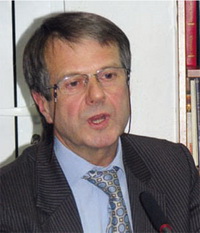 Ever since Ukraine regained independence in 1991, it has not had a complete economy. It had been part of a very specific yet integral commercial complex oriented towards satisfying the economic, military and other needs of the entire USSR.
Ever since Ukraine regained independence in 1991, it has not had a complete economy. It had been part of a very specific yet integral commercial complex oriented towards satisfying the economic, military and other needs of the entire USSR.
Ukraine faced the challenge of transforming a fragment of the command and militarized economy that had been part of the “Union’s national economic complex” into a modern national market-type economy. What made the task even more difficult was that Ukraine’s economy was more distorted than that of other republics, such as Estonia, Lithuania or Uzbekistan. The lion’s share of Ukrainian industrial output was produced by heavy industries, such as the machine building, chemical or defence machinery branches. Hence the huge energy consumption that remains until the present. In 1990, Ukraine consumed thirteen times more energy than Germany per USD 1,000 of GDP, and ten times more than France. Most of these products were either raw materials or used in production; intermediate goods and components were exported to Russia. As a result, consumer goods accounted for only 13% of total output.
Ukraine failed to convert this vast, heavy, energy-guzzling and inefficient fragment into a modern market-type national economy over the 21 years of its independence. Today, Ukraine’s economy is as distorted, monopolized, resource-oriented, energy-consuming and inefficient as it was back then. Over this period, industrial production has become even more concentrated on resource industries.
The only thing that changed dramatically was the structure of ownership in the economy. In the past, the government was the key owner. Today, it’s the oligarchs. According to Dragon Capital, the six richest Ukrainians out of the top 100 own assets worth USD 35bn. This is several billion more than the total assets of the remaining 94. Overall, the share of assets of the 100 richest Ukrainians is 38% of the country’s GDP, compared to 11% in Germany, 10% in France, 7% in USA and 22% in Russia.
Nearly 95% of Ukrainian industrial output is produced at enterprises with third and fourth stage technology. These are steelworks, the chemical sector, the fuel extraction complex and heavy engineering. The third stage enjoyed world domination in 1880-1930.
Meanwhile, the share of fifth and sixth stage enterprises that dominate global industrial production today, based on electronics, computing and fibre-optic technologies, software, telecommunications, robot design, IT services and biotechnologies, does not exceed 5% in Ukraine. However, these are the branches that generate the biggest added value per unit of production, which exceeds that of third or fourth stage enterprises – most of them owned by oligarchs – tens or hundreds of times.
Therefore, the structure of the Ukrainian economy has deteriorated rather than improved since Ukraine regained independence as time did not stand still.
Industry as the leader of the Ukrainian economy produces extremely low added value. Its profitability did not exceed 3-6% in 2003-2011. A third of the 55,000 enterprises in Ukraine operate at a loss.
This results in low salaries, tiny profits and mandatory social benefits for employees, hence low pensions, the lack of adequate revenues to the country’s budgets or money to upgrade facilities and create new jobs, as well as unemployment.
Monopolies, inefficiency and uncompetitive business caused by the oligarchic structure result in a slew of major problems, such as inefficient exports and imports, a trade deficit, the constant threat of the devaluation of the hryvnia, a disastrous deficit of budget funds and a permanent increase in public debt, as well as the threat of default.
All this together is the poverty of the country, its people and non-oligarchic business.
Ukraine’s principal exports are raw materials. In 2011, they accounted for over 2/3 of total exports, with 33% for iron and steel, 15% for minerals products, 13% for food, primarily grain, and oil; and 9% for chemicals.
The production and export of iron and steel is the domain of the five richest oligarchs, therefore exports are a key subject for some top officials. Ukraine is the eight biggest producer of steel, behind China, Japan, the USA, India, Russia, South Korea and Germany. In 2011, it produced 35.5mn t. Unlike other countries, exporting from 4% (China) to 30% (Japan) of total output, Ukraine exports a record-breaking 68% or 24mn t. This is double the 34% it exported as part of the USSR.
Inefficient imports reflect the fact that Ukraine does not currently produce basic goods, so is forced to buy everything from abroad. In 2011, only 5.3% of all light industry produce bought by Ukrainians domestically were produced in Ukraine. The rest was imported. 18% of medicines consumed were Ukrainian. Surprisingly, Ukraine imports more ready-made food than it exports.
Ukraine’s principal imports include energy sources, specifically oil and gas. In 2011, Ukraine bought gas worth USD 14.1bn and USD 4.3bn worth of oil. This was 35% of total imports or USD 18.4bn. They are largely used to produce power which in turn is used as a resource in the production of goods for Ukraine’s ineffective exports. Therefore, higher exports boost imports in this vicious circle of energy dependence.
The trade deficit shows that imports have exceeded exports in Ukraine for many years.
According to the State Statistics Committee, the trade deficit was USD 14.2 bn in 2011 and an estimated USD 15bn in 2012.
Last but not least is public debt, caused by the inefficient economy that offers low salaries and equally low revenues to the State Budget, the Pension Fund and other social funds. Hence the need for additional resources and the current disastrous deficit thereof. As a result, public debt has grown inexorably from UAH 308bn in 2009 to UAH 500bn in 2012. The plan for 2013 is to borrow a further UAH 136bn. Add the escalating cost of debt, which will eat up UAH 101bn in 2013 and compare it with total state budget revenues of UAH 362bn.
Why is this? The key reason is the oligarchic economic structure, oriented towards the conservation and exploitation of large enterprises and production facilities left over from the Soviet economy, acquired for peanuts and which is largely directed towards the export of raw materials at any price. In fact, this status quo also hits oligarchs. In 2012, the assets of the 100 richest people in Ukraine decreased by 25%, while the assets of financial and industrial groups owned by the top five oligarchs, such as SKM, Privat and EastOne, lost 30%-40% of their value.
Thus, the oligarchic economy brings forth low added value, salaries and revenues to the budget; consumes a lot of fuel and makes the country rely on imported fuels; causes a foreign currency deficit and the constant risk of hryvnia devaluation; boosts public debt and turmoil, also wipes out demand for a well-educated and qualified workforce. It causes poverty, as 70% of household consumer spending is on food and basic goods, leaving only 3.8% for vacations and entertainment and 1.1% for education.
Ukrainian oligarchs are far from the Rockefellers of the early 20th century, as some describe them. Rockefellers built railways that were as innovative then, as Google or nanotechnologies are today – these are all products with the highest added value. Ukrainian oligarchs invest in resource-oriented industries that hamper the progress of Ukraine’s economy, since their added value is the lowest. This makes them look more like the biggest landowners in the American south, who opposed the abolition of slavery and did everything possible to hamper the industrial revolution in the US.
“The oligarchic model must be transformed into a free market model, as well as a competitive and responsible economic system”
Volodymyr Lanovyi, President of the Centre for Market Reforms
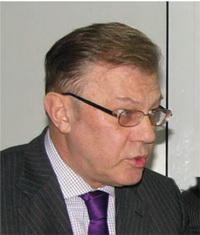 The current oligarchic system, its generation of the disproportional allocation of national wealth and the absence of development prospects are the reasons for most of the problems in the Ukrainian economy, the social sphere and education.
The current oligarchic system, its generation of the disproportional allocation of national wealth and the absence of development prospects are the reasons for most of the problems in the Ukrainian economy, the social sphere and education.
The issue is not that there should not be any big owners, major entrepreneurs and corporations, but that they should be “entrepreneurial” – that’s the key word! Entrepreneurial means searching, innovative and professional, who think about improvement and about qualitative changes in their business, their industry and at their enterprise. This is the main thing. This is what brings the economy to higher competitive levels. Countries that failed to work on innovations and did not create an entrepreneurial environment, have achieved nothing.
Meanwhile, the oligarchic order in Ukraine has a key difference from the situation in developed countries, when talking about the influence of big business. For example, in the West, entrepreneurs attempting to engage political means for the active development of their business, are involved in just one type of activity, are concerned with their own matters and improve them. Everything is different in Ukraine. Our oligarchs are people who from the very start had a close connection with various levels of officialdom and who obtained the opportunity to indiscriminately seize different enterprises, to which they did not have any professional relation. They did not look for the realization of any ideas or research that they could have had in them, simply took what was available and that which was allocated to them. As a result, they seized tens and hundreds of enterprises, often using corruptive means. Our oligarchy could not have come into being without corruption and today, cannot operate without it.
Having seized such a vast number of facilities and not having the slightest idea of what to do with them, they feel that having hired the best managers, they will be able to efficiently manage these assets by phone from the Bahamas. This type of “entrepreneurial” psychology is the very natural state of an oligarch. When he becomes aware of the scale of his assets, he wants to increase them, but is not interested in individual enterprises and their prospects. Thus, this type of oligarchic business, which is artificially created in Ukraine, Russia and several other countries, is based on the seizure of a vast number of enterprises in various industries and is characterized by the fact that their owner has absolutely nothing to do with their management; they simply serve him to generate income.
Oligarchs are not interested in the development of their enterprises. On the contrary, they exhaust them and invest in the most attractive assets. For example, Rinat Akhmentov himself, not having modernized the steelwork facilities that he owns, invests in mobile communications. But what contribution has he made to it? What innovations, what programmes, which additional services? Nothing. In other words, it’s simply the investment of capital, particularly abroad, because there is literally nothing to invest in any more in Ukraine. This is why capital is so actively leaving the country right now. Oligarchs do not bind their future with the Ukrainian economy or Ukraine itself. It’s non-national business.
Oligarchic capital is bad because it comes to politics, which the oligarch needs to become richer. He is incapable of improving enterprises, so with the aid of the government, gets better prices, cheap resources, soft loans, tax benefits and highly profitable enterprises. He has thus deprived Ukraine of ensuring the possibility of ensuring the resource development of other economic components. In this context, his influence on elections and the formation of parliament, the government and national programmes is decisive. Our programmes for economic and social development are the complex business plans of individual moneybags.
Oligarchs don’t need normal markets, competition, true entrepreneurship, economic freedoms, free resources and a favourable financial climate to build such an economy, where they receive benefits from the government. Since oligarchs don’t care about their individual facilities and since they don’t have the time or need to develop them, the latter undergo degradation, as does the economy, which loses its competitiveness. Enterprises are becoming degraded and will gradually grind to a halt and close down, while the number of jobs will actively decrease.
In other words, the oligarchic model is not simply without prospects, it’s also destructive. It has to be reformed into a different economic model of a free market, as well as a competitive and responsible economic system.
So the key task is to eliminate oligarchs from government and deprive them of the possibility to gain income, illegal means for their enrichment, influence on political processes and the process for the forming of the government.
“It is necessary to motivate or force big capital to be socially responsible”
Andriy Pavlovsky, MP, All-Ukrainian Union “Batkivshchyna” (Fatherland)
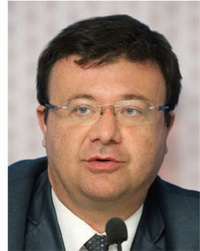 The continuation of the oligarchic economic system became possible because in the early 1990s, power was taken by a mix of Soviet red directors with capital that clearly belonged to the mafia.
The continuation of the oligarchic economic system became possible because in the early 1990s, power was taken by a mix of Soviet red directors with capital that clearly belonged to the mafia.
But who will transform it? Will it be by peaceful means, or will there be some kind of new Ukrainian social revolution? These are very urgent issues, to which, unfortunately, there are still no answers. At the same time, there is the prospect that by joining forces, we could demand a change in Ukraine’s leadership. But in principle, pro-Ukrainian forces should take the helm and use their power to do what is necessary. It is necessary to motivate or force big capital to be socially responsible. The leverage of state regulation is sufficient to do this. It is necessary to finally implement antimonopoly legislation, which has not been the case in Ukraine. After all, every oligarch is actually a monopolist in a specific sphere of the economy. In essence, the Anti-Monopoly Committee of Ukraine (AMCU) is turning a blind eye to the situation. Since the AMCU is headed by Rinat Akhmetov’s people, what else can be expected from it?
It is necessary to raise the issue of the renewal of basic social justice and the distribution of national wealth and incomes, since 1–2% of people control 90% of the economy, while according to the UN, 80% are on the verge poverty in Ukraine. So it is necessary to make the redistribution fair. It should be said that there are such strategic enterprises as the railway, ports, military facilities and the defense industry, which must remain the property of the state. If they are currently in the hands of the oligarchs, there is no reason to be afraid of the word “nationalization”. Why is Ukraine one of the few countries that does not have a luxury tax? Why are we afraid of this, why is there no progressive tax scale, which exists in such countries as the USA and most European countries? Unfortunately, the old national democrats had a phobia – they were afraid of being accused of being leftist or communist. As a result, we have landed ourselves in a situation whereby people who oppose anything Ukrainian own everything, while Ukrainians will once again be the hired help, slaves, if you will. So oligarchs simply view Ukraine as a territory where they can make money. They see the Ukrainian population as mute cattle which have to be squeezed out and bring them huge profits with their hard work.
If we come to terms with this, in about 50 years, Ukraine will only have a population of 20 million. If we want to fight for Ukraine, then it is possible that bodies or civil organizations that are above parties have to be created, for example, a kind of Ukrainian Solidarity, which will fight for such basic things as democracy and justice, and ultimately, for the survival of the Ukrainian nation.
“The law on the liquidation of private monopolies will be a test for the current oligarchs’ patriotism”
Oleksandr Bondar, Head of the Expert Group of the All-Ukrainian Union Svoboda in Parliament
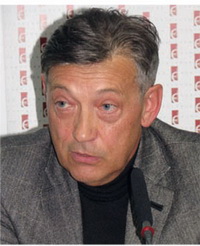 I shall address two draft laws, prepared under my leadership by the Expert Group of the All-Ukrainian Union Svoboda and will now be realized in parliament. They are documents, which will resolve not all, but most of the indicated issues: two fundamental problems that are in the oligarchic capital of Ukraine; private monopolies and offshore accounts.
I shall address two draft laws, prepared under my leadership by the Expert Group of the All-Ukrainian Union Svoboda and will now be realized in parliament. They are documents, which will resolve not all, but most of the indicated issues: two fundamental problems that are in the oligarchic capital of Ukraine; private monopolies and offshore accounts.
Firstly – the law on the liquidation of private monopolies. I anticipate, so to say, a test of the commitment to the market economy of the current oligarchs, who have concentrated their assets in a range of Ukraine’s industries. We recommend that they voluntarily turn over those, through which their share on the national or regional level exceeds 25%, which, by the way, is already prohibited today by anti-monopoly legislation, and on which the Anti-Monopoly Committee holds relevant information. At the same time, the difference in the sale of state property will be forwarded to the State Treasury – the holders of the assets will be reimbursed the funds which they paid at the time for their acquisition and the balance gained from selling at open auctions will be transferred to the State Budget.
If the owners reject the voluntary sale of a share of their assets, their property will be returned to state ownership via the entry of the State Property Fund of Ukraine (SPFU) into the Shareholders’ Register in their stead. It will either be re-sold or remain under state ownership. Once more, they will only be reimbursed the amount that they spent on the acquisition of the relevant facilities in their time, while the balance will be forwarded to the State Budget.
The second draft law on the voluntary-coercive return of property from abroad, at which not only from offshore zones, but also Cyprus and other zones, which fall under the standards of the so-called evasion of double taxation. It is through them that funds are taken out of Ukraine by our oligarchs. Vast sums of money are transferred abroad via these schemes. The latest data shows that USD 100bn has been transferred since Ukraine’s independence, of which USD 70bn was transferred during the rule of the current “government of professionals”. Clearly, the oligarchs themselves don’t believe the current government, because they well understand who is ruling Ukraine and what can happen next.
Our proposal on this issue is also very simple and comprehensible, as well as being of a voluntary-coercive nature: three months are allowed for the re-registration of all offshore companies in Ukraine, after which an account is opened for the structures at Ukrainian banks. All funds located abroad are transferred to them. 50% of these funds are forwarded to the budget and the balance remains with the company for investment in the enterprises they own. 50% is the mandatory tax, after all, these funds were taken out of Ukraine for many years and taxes were not paid on them. If this does not happen voluntarily within three months, the same scheme comes into effect as the one in the previous draft law: the SPFU is entered into the register of Ukrainian entrepreneurs instead of the offshore companies. The SPFU sells this property or it remains under state ownership; the funds that their owners spent when they acquired the relevant property are returned to them, while the rest is forwarded to the State Treasury.
If these oligarchs consider themselves to be Ukrainian entrepreneurs and want to operate in Ukraine, we give them the right to re-register in Ukraine and truly promote its development. If not, then too bad: offshore companies will not be allowed to own any property in Ukraine and all those who have funds abroad will not be able to spend a single penny to buy something – it will be illegal to do so. The MPs who do not want to support this law will demonstrate that they are either afraid of the oligarchs, or that they are working under optimization schemes, using offshore accounts.
“The main problem is the total monopolization of the economy by oligarchs”
Yuriy Levchenko, Head of the Analytical Service of All-Ukrainian Union Svoboda
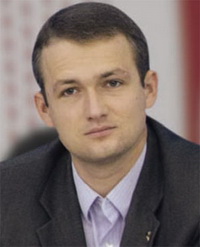 Our main problem today is the total monopolization of the economy by oligarchs.
Our main problem today is the total monopolization of the economy by oligarchs.
With the existence of private monopolies, there is absolutely no need for competition. Oligarchs don’t need to compete; it’s easier for them to come to an agreement among themselves. The oligarchy is actually created by several private monopolies, let’s say, a cartel conspiracy on the level of the entire country. They have no need to enter someone else’s niche or to fight for the labour resource market, etc, not to mention the modernization of the economy. More specifically, many steelworks are still operating on equipment from the 1950–1970s.
Oligarchs also have absolutely no need to develop the domestic market, because they understand full well that being monopolists, it is sufficient for them to work for export and have the same earnings that they would gain without the development of the domestic market. This is why they don’t actually associate themselves with the future of Ukraine.
Finally, the oligarchic model is blocking the development of other branches of the economy through oligarchic political control.
As a result, the most modern branches are at a standstill (biophysics, computer technology), because oligarchs don’t see the need to promote state support for them.
Another aspect is the control of the labour market. The fact that five-six people actually control the entire economy and that they are participants in a cartel conspiracy, leads to the fact that they have exclusive control over the Ukrainian labour market. In actual fact, in one way or another they agree among themselves about the fixing of salary levels. And in essence, Ukrainians have no choice as regards where to work. This maintains the current impoverishment level of the Ukrainian people.
By controlling the labour market, they also control politics. It’s a vicious circle. We see numerous instances whereby, for example, during the last election, the employees of one enterprise or another were forced to vote for the parties which are actually supported by relevant oligarchic organizations.
Oleksandr Bondar has already made public the draft laws that we shall be proposing in this parliament, but I would like to add that for many years, Svoboda has stood for the liquidation of private, let me reiterate, specifically private monopolies on the Ukrainian market, as well as the nationalization of strategic enterprises. We also stand for a ban on the privatization of those that have not yet been privatized.
In any case, regardless of any variables there is a clearly determined list of strategic enterprises that have to be owned by the state. They include power-generating and energy-distribution companies, the Ukrainian railway and Ukrtelecom, in other words, so-called natural monopolies. When the state has a certain influence on one of them, using market methods, I repeat – market methods, it can impact its development and be one of the factors that will prevent a single person from monopolizing an entire branch in the future.
“The oligarchic model makes Ukraine vulnerable to external influence”
Rostyslav Pavlenko, MP, UDAR
 In essence, this model is noncompetitive and extensive in the sense that it develops for as long as there is something ready that can be handed out and is extremely vulnerable to risks – both internal and external. In addition to the fact that it can last for years if there are sufficient resources to divide it all up, it experiences huge losses in the face of the slightest adversity. We saw this in the 1998 and 2008 crises, and there are gloomy forecasts for 2013. If there are significant external challenges, such a model makes Ukraine vulnerable to both external influences and to the loss of independence if a certain level of the survival instinct among its players is exceeded by today’s mercantile interests. Thus, the view that oligarchs are the source of our independence is mistaken. They will be ready to reject it if offered higher immediate profits. Attempts to drag Ukraine into the Customs Union with Russia are a clear illustration of this.
In essence, this model is noncompetitive and extensive in the sense that it develops for as long as there is something ready that can be handed out and is extremely vulnerable to risks – both internal and external. In addition to the fact that it can last for years if there are sufficient resources to divide it all up, it experiences huge losses in the face of the slightest adversity. We saw this in the 1998 and 2008 crises, and there are gloomy forecasts for 2013. If there are significant external challenges, such a model makes Ukraine vulnerable to both external influences and to the loss of independence if a certain level of the survival instinct among its players is exceeded by today’s mercantile interests. Thus, the view that oligarchs are the source of our independence is mistaken. They will be ready to reject it if offered higher immediate profits. Attempts to drag Ukraine into the Customs Union with Russia are a clear illustration of this.
Determinant indicators of the monopolist model include artificial monopolization and high corruption on all levels, beginning with the political one, in other words, influence on the rules of the game and decision-making and ending with the so-called insignificant one, when there is an exchange of services at different levels, which replace the rules which would have applied to everyone. A peculiar mutual responsibility is thus created, where it is very difficult to find the thread which needs to be pulled, in order to finally bring this model to an end and replace it with a more competitive and viable one.
The issue of what to do can be resolved in several directions. Firstly – economic. This is the issue of de-monopolization. It’s the issue of freeing business, both small and medium-sized, as well as non-oligarchic big business, from official pressure, also that of the oligarch, connected to this official. It should pertain to the establishment of necessary condition for the emergence of new players on the market, who would create jobs and introduce new ideas.
The second important direction is overcoming corruption via several mutually-related things. First of all, the transparency of procedures. Any budget expenses must be open to the public. Moreover, the latter, be it through politicians or directly, must have influence and capability, hold certain information and apply this knowledge to control certain officials. The issue of an independent arbiter also emerges; in other words, that which is known as judicial reform.
I think that depending on how much clearer the economic crisis and the crisis in the administrative methods of the current regime become, certain elements of what has been stated here could pass through parliament. But this is also an issue of partnership with civil society. The above-mentioned initiatives can only be realized via these means.
“We still have every chance to overcome oligarchy during our lifetime and at the same time, not cause harm to small and medium-sized business”
Oksana Prodan, MP, UDAR
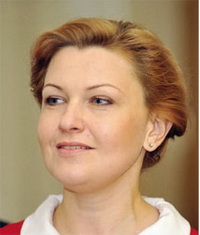 Today, it is only possible to start production in Ukraine, at which not only on a large scale, providing there is a connection with the government. Thus we do not have independent business. So even those, whom we don’t included in the six-seven or ten families, are still related to the government to a lesser or greater degree. And they are forced to give it at least 50% of their earnings.
Today, it is only possible to start production in Ukraine, at which not only on a large scale, providing there is a connection with the government. Thus we do not have independent business. So even those, whom we don’t included in the six-seven or ten families, are still related to the government to a lesser or greater degree. And they are forced to give it at least 50% of their earnings.
Why are we convinced that change is possible? First and foremost, because even oligarchs have begun to lose assets in Ukraine. This proves that the existing system requires change from even their point of view. This is one of the favourable factors that could be positive for us and for a change in the system. In addition, internecine wars have begun between the oligarchs themselves. The fact that one Family, the president’s family, which was not previously one of the six, but which gained oligarchic status simply by gaining the highest authority in Ukraine, is trying to seize and make other oligarchic groups dependent on it, gives us the chance, that while fighting among themselves, they will lose the control that they have today.
Will we be able to take advantage of this? First of all, we need a strong society. We have already spoken about both the interdependence between each of us, and about the symptom of the fact that we are developing and will have the opportunity to change the system. Secondly, everything possible has to be done to ensure that in parliament (because it is also part of the government), the opposition is the leader of society, which it will never break away from.
What is the first thing that has to be done? It is necessary to ensure the execution of the laws of Ukraine. No draft laws, however good they may be (for example, we have good laws in the sphere of regulatory policy, but they don’t work), they will not come into effect until the courts actually start working properly. This is one of the most important things for all opposition forces and society as a whole. The next fundamental issue is the establishment of equal conditions for everyone who wants to be involved in business, and everyone who simply wants to work in Ukraine. “The battle with corruption” is significantly devalued, not only for experts, but also for regular citizens, as are “reforms”. UDAR has already developed draft laws, which realistically make corruption impossible in the sphere of business regulation and removes the possibility of officials making fateful decisions at their own discretion.
We realistically have every chance of overcoming the oligarchy during our own lifetime and do it in such a way that will not cause any harm to small and medium-sized business, the interests of which I represent. It is this business that is the foundation of democracy in many countries. It has to become the foundation of both democracy and competition in the Ukraine of the future.
It is important for us not only to nationalize, remove or change the owner of one enterprise or another, but to also have a package of decisions that must be approved simultaneously, in order to change the system in which the oligarchs were formed.

